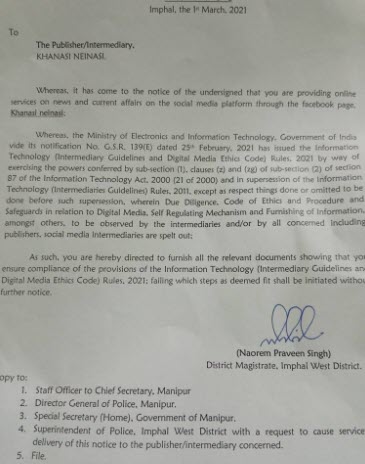On 25th February 2021, the Government of India notified a landmark set of rules under Section 79 of Information Technology Act 2000 (ITA 2000) called the Information Technology (Intermediary Guidelines and Digital Media ethics Code) Rules 2021.
Since the regulation is against the “Digital Media” it is a sensitive regulation which will definitely be opposed by the media and the Government would have to face the allegation that this in attempt to muzzle the Press.
We already have the Maharashtra Police under the Shivasena Government behaving like a mafia against the Republic TV, Ms Kangana Raut, a Retired Naval Officer, the BARC officials etc completely discrediting the police force in the entire country by misapplying law to serve political masters. In 2012 it was again the Maharashtra Police who arrested two girls from Palghar which eventually led to the scrapping of Section 66A.
Now a Manipur Magistrate appears to have committed a blunder which will discredit the new notification and strengthen the voice of the opponents that the notification can be misused and hence should be scrapped. It is possible that just as in the case of Section 66A, even the Supreme Court did not identify that the Palghar girl’s arrest was not because of the Section 66A being anti constitutional but because the local police made the mistake of invoking the section when it did not apply to the given context. The fact that all Courts including the Magistrate’s court which committed the two girls to judicial custody for 15 days, the Mumbai High Court and also the Supreme Court failed to recognize that Section 66A applied to “Messages” and not to “Publications” like Facebook or Twitter and proceed to scrap it ostensibly to uphold freedom of expression.
The Manipur magistrate’s order which is reproduced below indicates that the Magistrate has failed to appreciate the objective of Section 79 of ITA 2000 and the subject notification.
The Wire.in has promptly highlighted the issue of the notice .
Though it appears that the notice was subsequently withdrawn, it is clear that the Magistrate had not applied his mind before issuing the order.
It must be realized that Section 79 of ITA 2000 is not an independent penal section of ITA 2000 and no body can be punished or fined solely for being in violation of Section 79 or its rules. Section 79 is a Safe harbor section which says that if an Intermediary has committed any offence, it can claim protection as provided in the Section 79 and the rules.
Hence the notice is ultra-vires the powers of the Magistrate and it had no value. Withdrawal of the notice was therefore correct and meant to limit the damage to the publication to which the notice was issued but cannot prevent the damage to the reputation of the lower judiciary.
The publication has rightly indicated that it may take legal action against the Police and the DM for harassment. A similar action against the Maharashtra Police is long overdue and this case may trigger similar action against the Shivasena Police also.
This is however not a Section 79 issue or the issue that the notification is curbing the “Freedom of Speech”. The issue is that our Police and the lower Judiciary donot know the law correctly and mis apply the law routinely. Action should therefore be taken against those who are responsible for educating the magistrates, the Police and the Public Prosecutors.
This education also has to happen through the media only. Hopefully the journalists will understand the law properly and ensure that mis-information is not spread on what the law is not.
Naavi








